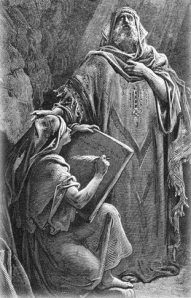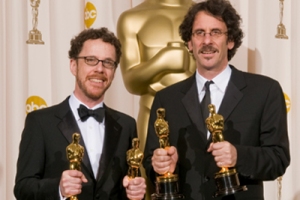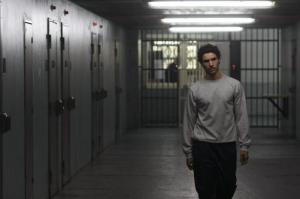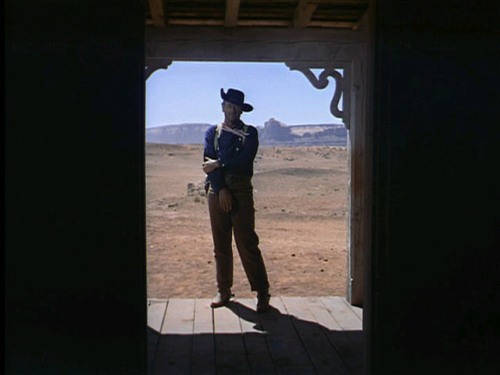 There is always something in the Coen Bros. movies that doesn’t congeal. Not even in No Country for Old Men, where they had the great advantage of working from a seminal text. With True Grit, they are remaking an originally bad film that only warrants notice for John Wayne’s Oscar performance (which was a belated Oscar for his majestic performance in Ford’s The Searchers, some fifteen years earlier.)
There is always something in the Coen Bros. movies that doesn’t congeal. Not even in No Country for Old Men, where they had the great advantage of working from a seminal text. With True Grit, they are remaking an originally bad film that only warrants notice for John Wayne’s Oscar performance (which was a belated Oscar for his majestic performance in Ford’s The Searchers, some fifteen years earlier.)
The examination of the American myth, as seen (almost entirely) from the perspective of the west (and western) remains a fascinating subject, and a durable one, and perhaps, even, today a highly resonant one. True Grit however is an overblown self important exercise in only filmic self reference. If Wayne came to embody several sides of the American character (simultaneously) then Jeff Bridges only serves as a single side — and that is best captured in the Coen Bros. best film, The Big Lebowski.
He hasn’t the basic mean spiritedness of Ethan Edwards — nor can he approach an Ahab like madness, nor anything proto — he finally does not have that kind of gravitas. The fault in True Grit however, is not Bridges, it is the basic lack of real artistic vision in the Coens.
Wayne was scary. Even at his most sentimental, one sensed a dark side. For True Grit to deliver us the ‘journey’ of young Maddie Rose, there needed to be a genuine fear of Rooster Cogburn. And Cogburn, because of exactly his darkness and ruthlessness, would be the man to take her across the river to the underworld that presages adulthood. The Coens seem not to have given any thought to this. Despite a good amount of dialogue about the “wildness” of the Indian territory they are crossing — one never feels a bit of unease. Matt Damon is the perfect wrong choice…..exactly the wrong actor to play the stalwart young Texas Ranger who has come for the killer of Maddie’s father, along with Rooster and Maddie. Damon continues to get cast in parts he is ill suited for….but none has been as egregiously wrong as this one.
 The story itself has built in anti climaxes — and the Coens do nothing to counter this by way of delving more deeply into Cogburn and Maddie and the Ranger. There is only one brief moment…….when Damon suggests he contemplated stealing a kiss from the sleeping 14-year old Maddie, but chose against it because “she wasn’t attractive”, where one sits up and hopes we are about to go further into a dangerous place. Alas, we do not.
The story itself has built in anti climaxes — and the Coens do nothing to counter this by way of delving more deeply into Cogburn and Maddie and the Ranger. There is only one brief moment…….when Damon suggests he contemplated stealing a kiss from the sleeping 14-year old Maddie, but chose against it because “she wasn’t attractive”, where one sits up and hopes we are about to go further into a dangerous place. Alas, we do not.
This is the first time Josh Brolin has bored me. And the final framing device is ill executed. The adult Maddie simply is not who we think the 14-year old would grow into. Its an odd coda to a very trite film.
Now, I link this film to The Social Network — a film I saw a month ago but have been unable to write about. I’m not sure why, but there is something slippery in the Fincher film that stops me from feeling I have any idea of exactly how good or bad it is, or even if this is quite a film in the ordinary sense. That alone might be enough to give it praise. “Might” be enough, but isn’t. The story of Facebook founder Mark Zuckerberg should contain enough political content — enough for even a rudimentary critique of everything from the institution of Harvard, to a culture of money that is linked to global finance and the remnants of Imperial conquest. Fincher seems to have chosen to steer clear of critique. A number of reviewers see this otherwise. And I won’t argue, because as I say, I don’t quite know what my emotional response was, let alone my intellectual one.
Harvard is a bastion of privilege, and the iconic University for the U.S. It is short hand for the best and brightest. Fincher does provide a creepy glimpse of education (institutional anyway) in hyper dysfunction — and his focus on odd details of daily life at the dorms is the best part of the film. The film has a taut neurotic quality, and the camera is placed in odd places, enough times anyway, to suggest Fincher was after something of a vertiginous quality. Maybe its the basic banality of the Facebook story that makes the narrative sort of evaporate. The fact that Zuckerberg is alive and still quite young may also be a contributing factor to the lack of depth — the lack of something — in the ‘story”. If we speak again of journey’s, we simply don’t have one. In 30 more years, the saga of Facebook will, no doubt, provide ample material. Right now it does not.
In both films, for different reasons, narrative is adumbrated and unable to carry its audience along to a place where inner questioning should take place. True Grit simply never thought about this, and the Coen Bros. are consistent in not caring about such things. They are facile and clever, but never visionary. The Fincher film is hard to evaluate in these terms. His best work — Zodiac, or his turn with the Alien franchise, are always smart and while emotionally distant somehow, they do create a sense of the American experience at bedrock level. The daily emptiness of lives buffeted by the culture of distraction and propaganda. The overworked and confused characters have been consistent. This seems not so in The Social Network. Now, I never saw Benjamin Button — I mean why? I assumed Zodiac made little money and Fincher needed a mainstream film to sustain his A-list status. In any event, it’s exactly the sort of film I avoid. This brings us back to narrative itself. The ever more porous storytelling of studio films. One could probably track the erosion of character in Hollywood film, from the 70s until now without a lot of effort. What we are left with is Bridges as Cogburn. Or the empty prestige films like Black Swan and The King’s Speech.
Still, it’s a year or two that saw films like A Prophet, Animal Kingdom and Winter’s Bone, so there is a response to this void. The mythic qualities of films like A Prophet or Animal Kingdom are there because, firstly, the stories have clear sociological and political underpinnings. That sense of fable comes only after a genuine positing of a world where the contradictions are not ignored. It’s probably, therefore, not an accident that the three films I just mentioned all deal with crime and social transgression. It is only from such recognition that a mythic dimension will find oxygen.
John Steppling


